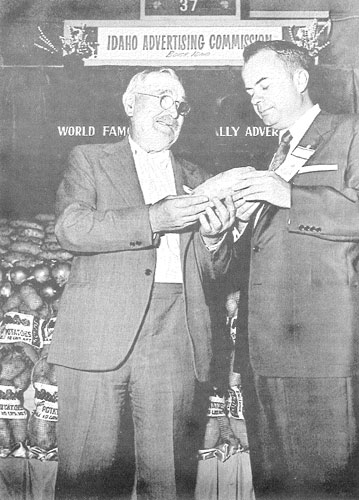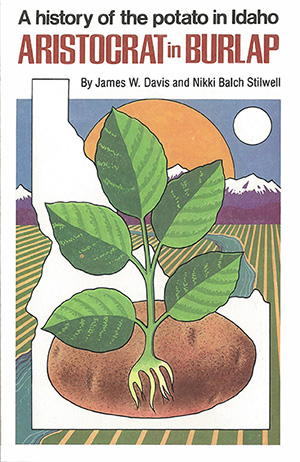 Marshall and Texas Attorney General at produce convention.
Marshall and Texas Attorney General at produce convention.
At this time, Joe Marshall sought a solution to the quality problem that was plaguing the Idaho potato growers. He did some extensive traveling-including a trip to Maine-to find out, if possible, why the quality of Idaho potatoes had deteriorated. From his experience and the information he was able to gather, he concluded that good-quality seed would be a major factor in rescuing the industry. He then started a quest for clean, disease-free seed and was able to find a carload in Montana and an additional quantity in Oregon. He bought these lots and brought them back to Idaho to be used in the production of more seed potatoes.
From one car of seed purchased in Oregon and three that came from Thompson Falls, Montana, he established a seed industry in the Ashton area by encouraging growers there to produce seed potatoes to be sold to the commercial growers to the south. In 1924, he shipped 150 carloads of certified seed potatoes from the Ashton and Driggs area in Eastern Idaho where the high altitude and isolation kept disease problems from developing.
Since Joe Marshall was supervising farming operations for the banks, he was able to convince the farmers that the use of specially grown certified seed would be a benefit to them. The practice immediately improved the quality of Idaho® potatoes and put the Idaho producing area ahead of others in the nation as far as the quality of their products was concerned.
During these years, Joe Marshall developed some marketing connections in Chicago and established a good reputation for the quality of his Blue Diamond brand potatoes. He personally oversaw the packing and shipping of the potatoes grown on his own farm and the farms that he was supervising for the bank, and his potatoes commanded a premium price wherever they were known and sold.
One year when the prices were particularly low and the average Idaho® potato was bringing 40 cents for a hundred-pound bag, Joe Marshall's potatoes brought $1.40 because the customers who knew the brand were willing to pay for the assured quality.
Under Marshall's management, most of the farmers who had been in financial trouble were able to pay off their mortgages and own their farms free and clear.


 Marshall and Texas Attorney General at produce convention.
Marshall and Texas Attorney General at produce convention.